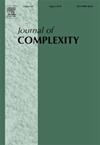基于鲁棒随机拟蒙特卡罗方法的误差分位数加速收敛
IF 1.8
2区 数学
Q1 MATHEMATICS
引用次数: 0
摘要
我们的目标是用一组估计量μ μ B计算函数F:[0,1]d∈R的期望μ(F)=E(F(U))。对于固定平方可积函数F和‖F‖L2≤1的函数的F类的最坏情况风险,标准蒙特卡罗方法均可获得1/B阶的均方根风险。相比之下,使用随机化拟蒙特卡罗(RQMC)方法序列,我们在确定函数F时,对σB=σB(F)的风险实现了更快的收敛σB≪1/B,而最坏情况的风险仍为1/B阶。我们处理绝对误差的分位数的收敛性,即对于给定的置信水平1 - δ,这是使P(|μ δ B(F)−μ(F)|>ε)≤δ成立的最小ε。我们表明,在固定函数F时,明智地选择鲁棒聚合方法与RQMC方法相结合,可以提高ε依赖于δ和B的收敛率。该研究包括对经验均值和亚高斯均值估计的浓度界的回顾,并得到数值实验的支持,范围从有界F到重尾F(U),后者非常适合具有奇点的函数F。我们测试过的不同方法都可以在Julia包中找到。本文章由计算机程序翻译,如有差异,请以英文原文为准。
Accelerated convergence of error quantiles using robust randomized quasi Monte Carlo methods
We aim to calculate an expectation for functions using a family of estimators with a budget of B evaluation points. The standard Monte Carlo method achieves a root mean squared risk of order , both for a fixed square integrable function F and for the worst-case risk over the class of functions with . Using a sequence of Randomized Quasi Monte Carlo (RQMC) methods, in contrast, we achieve faster convergence for the risk when fixing a function F, compared to the worst-case risk which is still of order . We address the convergence of quantiles of the absolute error, namely, for a given confidence level this is the minimal ε such that holds. We show that a judicious choice of a robust aggregation method coupled with RQMC methods allows reaching improved convergence rates for ε depending on δ and B when fixing a function F. This study includes a review on concentration bounds for the empirical mean as well as sub-Gaussian mean estimates and is supported by numerical experiments, ranging from bounded F to heavy-tailed , the latter being well suited to functions F with a singularity. The different methods we have tested are available in a Julia package.
求助全文
通过发布文献求助,成功后即可免费获取论文全文。
去求助
来源期刊

Journal of Complexity
工程技术-计算机:理论方法
CiteScore
3.10
自引率
17.60%
发文量
57
审稿时长
>12 weeks
期刊介绍:
The multidisciplinary Journal of Complexity publishes original research papers that contain substantial mathematical results on complexity as broadly conceived. Outstanding review papers will also be published. In the area of computational complexity, the focus is on complexity over the reals, with the emphasis on lower bounds and optimal algorithms. The Journal of Complexity also publishes articles that provide major new algorithms or make important progress on upper bounds. Other models of computation, such as the Turing machine model, are also of interest. Computational complexity results in a wide variety of areas are solicited.
Areas Include:
• Approximation theory
• Biomedical computing
• Compressed computing and sensing
• Computational finance
• Computational number theory
• Computational stochastics
• Control theory
• Cryptography
• Design of experiments
• Differential equations
• Discrete problems
• Distributed and parallel computation
• High and infinite-dimensional problems
• Information-based complexity
• Inverse and ill-posed problems
• Machine learning
• Markov chain Monte Carlo
• Monte Carlo and quasi-Monte Carlo
• Multivariate integration and approximation
• Noisy data
• Nonlinear and algebraic equations
• Numerical analysis
• Operator equations
• Optimization
• Quantum computing
• Scientific computation
• Tractability of multivariate problems
• Vision and image understanding.
 求助内容:
求助内容: 应助结果提醒方式:
应助结果提醒方式:


